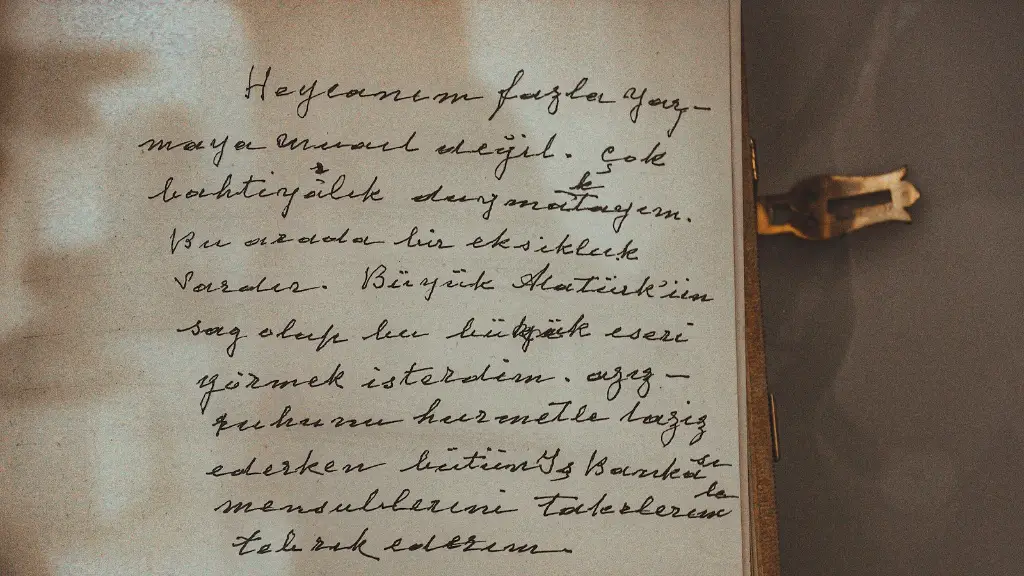Background of Langston Hughes
Langston Hughes was born on February 1, 1902, in Joplin, Missouri, to parents James Nathaniel Hughes and Carrie Mercer Langston Hughes. His parents divorced when he was a young child and Langston used his mother’s surname for his legal first name. Growing up, Hughes moved around with his mother and his father, eventually spending some of his youth in Lawrence, Kansas. While in Lawrence, he attended Central High School, where he wrote for the school newspaper. Hughes was an impressive student and was quickly approved for admission to Columbia University in New York.
Hughes’ Works and Writing Style
While at Columbia, Langston Hughes studied literature and began to write poetry reflecting the realities of African American life. His poetry, which was most popular during the early 1920s, featured jazz-inspired rhythms and vivid descriptions of urban life. Hughes is also credited with coining the phrase “the Harlem renaissance,” which referred to the cultural and intellectual rebirth of countless African Americans who lived in New York City in the 1920s and early 1930s.
Aside from his poetry, Hughes wrote numerous works including novels, plays, and short stories. His most famous novel was Not Without Laughter, which was published in 1930 and earned him the Harmon Gold Medal for literature.
His writing style was unique and made his works easily recognizable. He utilized many different literary techniques, such as alliteration, similes, metaphors, and internal rhyme. He was also known for his use of simple language, which allowed him to communicate his ideas to a wide audience. Overall, his works are considered to be an important part of American literature.
Legacy of Langston Hughes
Langston Hughes is viewed as one of the greatest African American poets of all time and is credited with putting African American literature on the map. His writings had a major influence on civil rights and black culture and served to continue the discussion of the African American experience. His poetry has been quoted in many speeches, including the famous “I Have a Dream” speech by Martin Luther King Jr.
In 1941, Langston Hughes was awarded an honorary doctorate from Howard University in recognition of his contributions to literature. Later in his life, Hughes was honored with the Spingarn Medal from the NAACP. Unfortunately, Hughes passed away from complications from prostate cancer on May 22, 1967, at the age of 65.
Langston Hughes’ Impact on Society
Langston Hughes’ influence on society was immense. His poems, plays, and fiction touched on themes of civil rights and the human condition, which resonated with people of all backgrounds. He was a pioneer in the field of literature, helping to shift the narrative of African American struggles and successes within the United States.
His work addressed controversial topics like racism, poverty, and oppression. His legacy has been honored by many schools, organizations, and other entities over the years. He is often credited with being one of the fathers of the Harlem Renaissance, a cultural, artistic, and intellectual movement of African Americans during the 1920s and 1930s.
Life Experiences Used in Hughes Work
Langston Hughes drew from his personal experience when creating his literary works. His writing highlighted issues related to oppression and racism widely experienced by black people during a time of segregation. His nostalgia for his childhood home of Lawrence, Kansas and his experiences traveling throughout the United States shaped the emotions and topics found in his writing.
During a time of racial discrimination, Langston Hughes helped to create a change in discourse about African American life. His works brought attention to the struggles of minorities in America and showed that every individual has value and deserves to be respected. He wrote from a place of understanding and empathy, as evidenced by his famous poem “The Negro Speaks of Rivers” and his celebration of racial pride in his work.
Hughes Work Being Taught in Schools
Nowadays, the works of Langston Hughes are being taught in schools across the United States. His works are widely known and can be found in books, online, and in classrooms. His works are used to teach students about the important topics of racism, social justice, civil rights, and American history.
His writings are often featured in anthologies and are used by teachers to discuss topics such as oppression, social class, and identity. Langston Hughes is widely respected for his work and is remembered for his contribution to African American literature and culture.
Langston Hughes’ Popularity
Langston Hughes’ works have grown in popularity over the years. His works are seen as classic texts and are widely read by both children and adults. His simple, yet moving, language makes it easier for people of all backgrounds to understand and appreciate his message.
He is widely cited and quoted not just by people of African descent but also by people of all racial backgrounds. His works have been adapted for various mediums including television, film, and musical theater. It is clear that Langston Hughes’ legacy continues to live on and will be appreciated for years to come.
Influence of Langston Hughes’ Works on the Music Industry
Langston Hughes’ works have had a major impact on many genres of music, including rap, hip-hop, and R&B. His writings have been sampled and featured in many popular songs, including Kendrick Lamar’s “Control,” Nas’s “The World is Yours,” and Kanye West’s “Big Brother.” He has also been referenced by many prominent rappers, including Jay-Z and Eminem.
His influence can be seen in music videos, where his poems appear as elements in the visuals. His themes have been explored and discussed heavily in the music industry, with artists translating his words and ideas into their own experiences.
Influence of Langston Hughes’ Works on the Visual Arts
Langston Hughes’ influence can also be seen in the visual arts. His words have been featured in many prominent pieces of art, such as the painting “Harlem Times” by Romare Bearden, which was inspired by Hughes’ poem “Dream variations.” His poetry has also been used in theatrical performances and plays.
His works have also been used to inspire films, including the critically acclaimed 2016 film “Hughes: A National Treasure.” Additionally, numerous museums have featured Hughes’ works in their collections, showcasing his contribution to both literature and the visual arts.
Langston Hughes’ Impact on Literature and Education
Langston Hughes has had a tremendous influence on literature, specifically in the field of African American literature. His works are studied in schools across the United States and are used to discuss topics related to race and oppression. His writing has also been heavily featured in anthologies and is required reading in many high school and college courses.
Additionally, his works are taught in many universities, stimulating discussions about race and culture. His works have also served to shed light on the ongoing struggle of African Americans both in the past and present.
Not only has Hughes’ work been featured in literature but also in the field of education. His works are often used as part of educational initiatives that aim to educate people about the hardships faced by African Americans. Many organizations have created educational programs centered around his works, engaging students in meaningful conversations about race, identity, and social justice.


